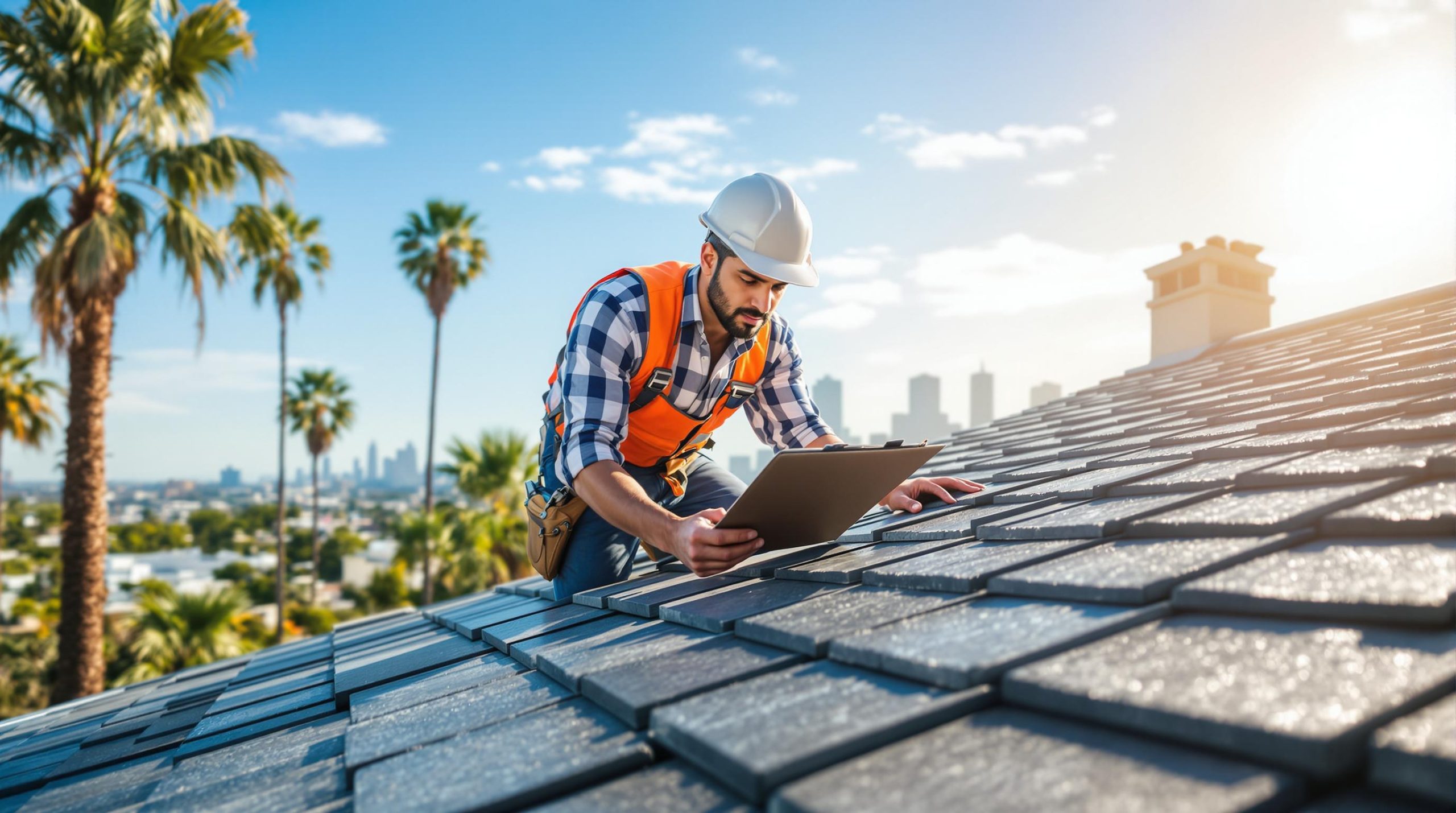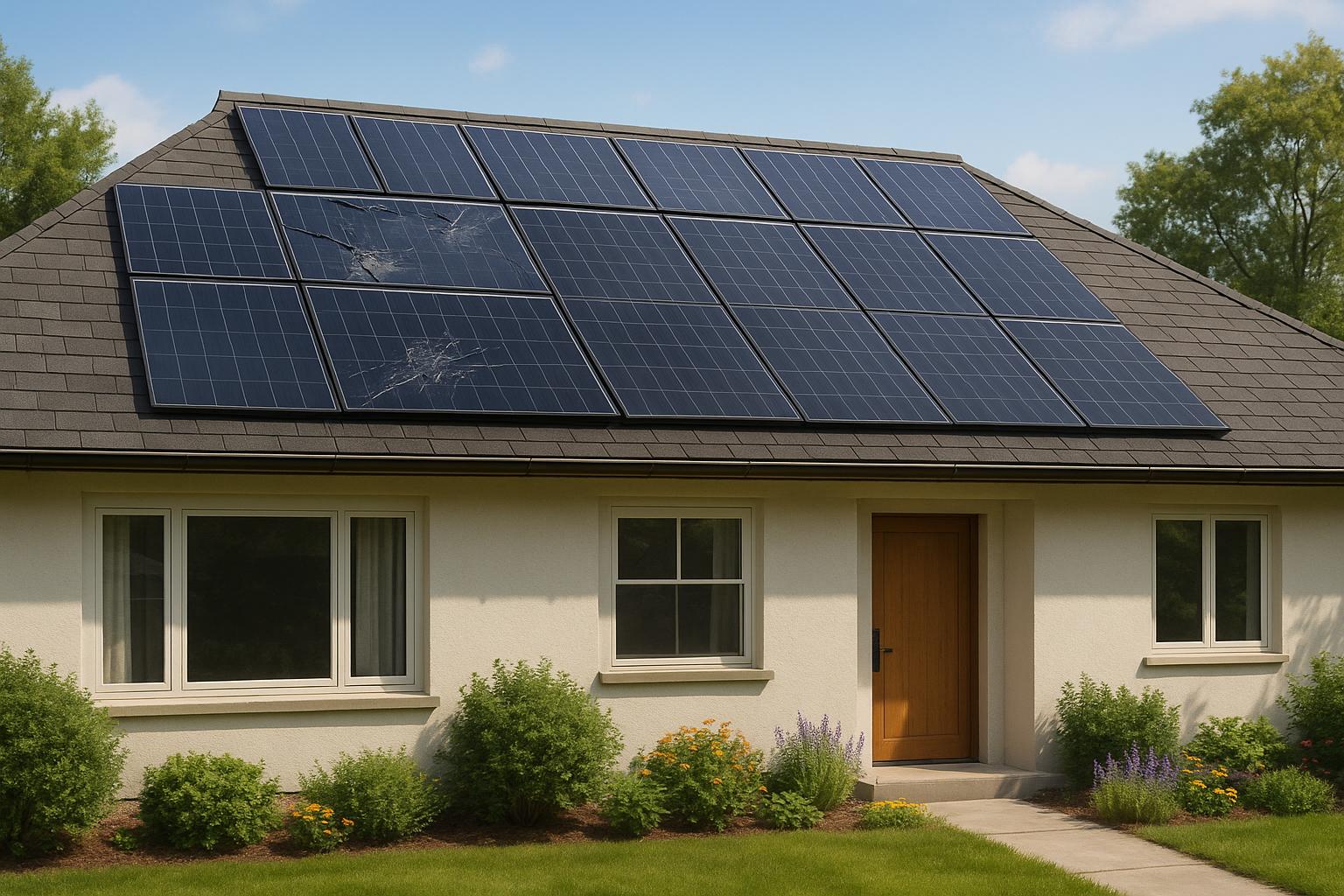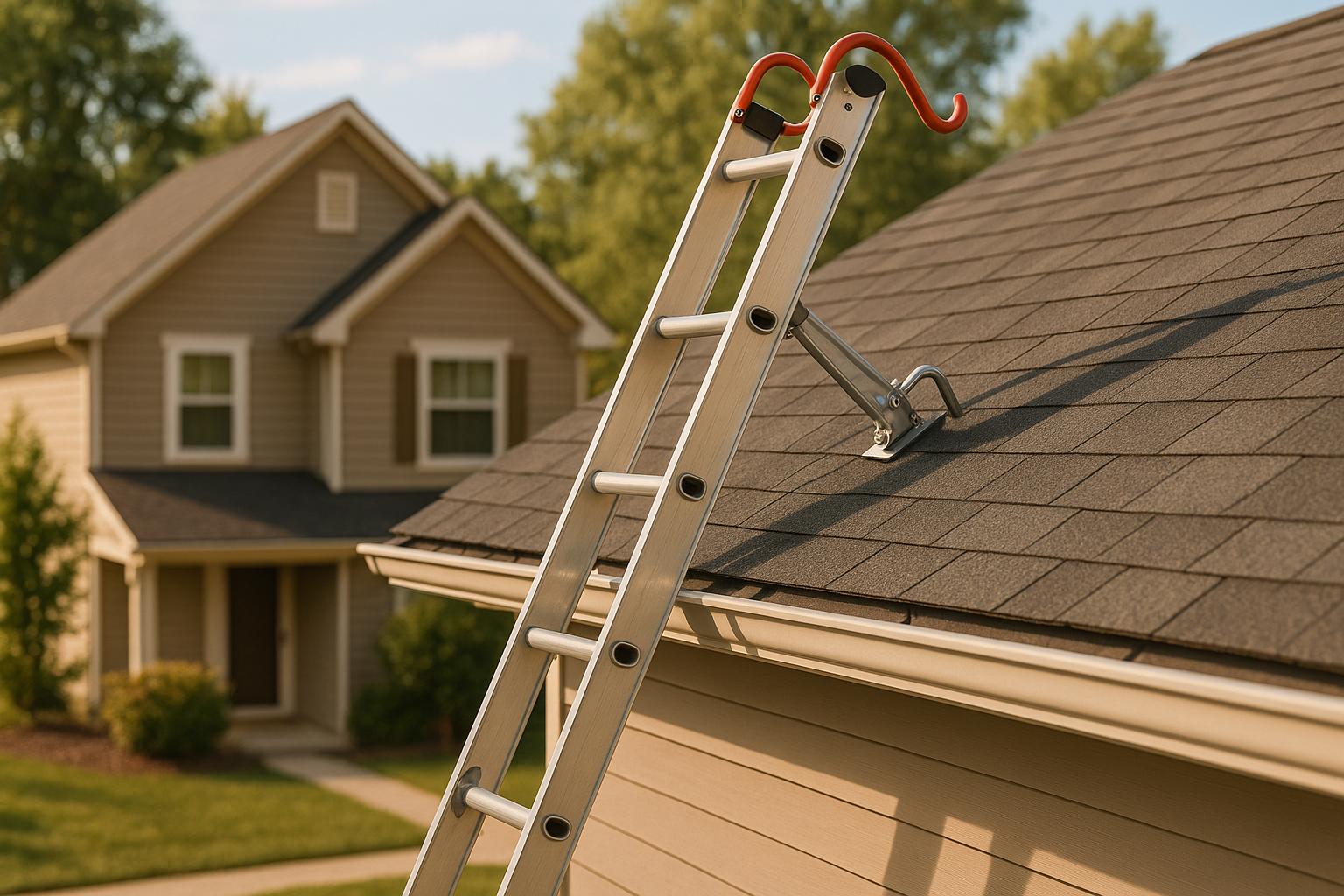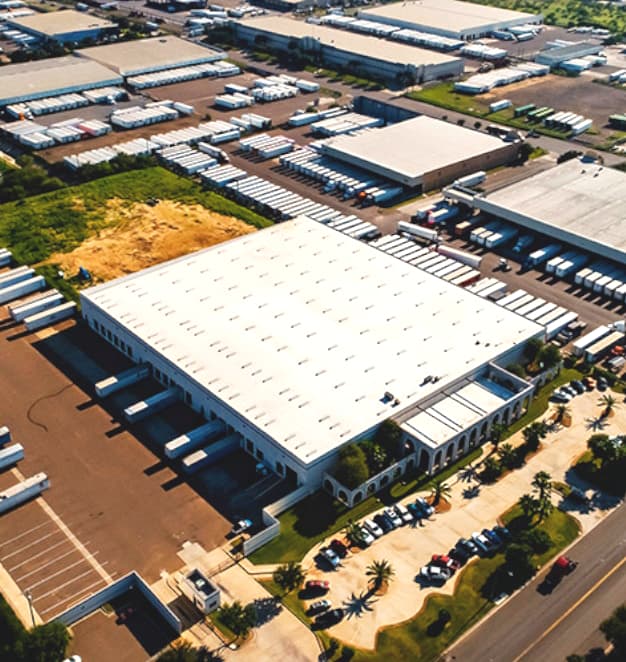Choosing the right slate roofing contractor in Los Angeles can save you time, money, and future headaches. Here’s what you need to know upfront:
- Why It Matters: Slate roofing requires specialized skills, and LA’s unique weather and building codes make expertise essential.
- Key Steps: Verify the contractor’s C-39 license, insurance, and slate roofing experience. Review their portfolio and references.
- What to Look For:
- High-quality materials (natural slate, corrosion-resistant nails, durable underlayment).
- Knowledge of LA-specific requirements (seismic considerations, UV-resistant materials).
- Clear warranties for materials and workmanship.
- Questions to Ask: What’s included in the estimate? How long will the project take? What’s their approach to installation and ventilation?
Quick Tip: Don’t just go for the lowest bid – prioritize experience, quality, and communication. A well-installed slate roof can last over 100 years, making it a long-term investment.
Keep reading for a detailed guide on finding the best contractor for your slate roofing project in LA.
Slate Roofing Basics
What Makes Up a Slate Roof
A slate roof is built using natural stone tiles that are layered to form a strong, water-resistant surface. The main components include:
- Natural slate tiles: Typically 1/4 to 1/2 inch thick and ranging from 6 to 24 inches in length.
- Underlayment: Made from synthetic or felt materials to provide extra water protection.
- Copper or stainless steel nails: Durable, rust-resistant fasteners that secure the slate.
- Flashing: Copper or lead pieces used in roof valleys and transitions for added protection.
Because slate is a metamorphic rock, each tile has its own unique color and texture, giving slate roofs their characteristic look, which stands out on Los Angeles homes.
Advantages of Slate Roofs
Slate roofs offer a variety of benefits, making them a popular choice for properties in Los Angeles. Below is a breakdown of their key advantages:
| Benefit | Description | Impact on LA Properties |
|---|---|---|
| Longevity | Lasts 75–200 years | A long-term investment in valuable real estate |
| Fire Resistance | Class A fire rating | Meets strict LA fire safety codes |
| Weather Protection | Resistant to rain and UV damage | Handles Southern California’s intense sun and weather |
| Energy Efficiency | Naturally insulates | Helps reduce cooling costs during hot summers |
| Property Value | Boosts home value by 5–7% on average | Offers a solid return in LA’s competitive housing market |
Los Angeles Building Requirements
Installing a slate roof in Los Angeles comes with specific building requirements to ensure safety and performance:
-
Building Code Compliance:
- A minimum slope of 4:12 is required for slate roofs.
- Wind resistance must be rated at 110 mph or higher.
- Structures must support the additional weight of a slate roof.
-
Local Weather Considerations:
- UV-resistant underlayment is essential.
- Flashing must be designed to handle heavy rain.
- Seismic considerations are necessary to secure tiles properly.
-
Installation Standards:
- Adequate ventilation systems are required.
- A minimum 3-inch overlap between tiles is mandatory.
- Fasteners must be corrosion-resistant.
Prime American Roofing ensures all installations meet or exceed these standards, using high-quality materials and expert craftsmanship. Proper adherence to these guidelines is crucial for a slate roof that performs well and lasts for decades.
How to Install a New Slate Roof by The Durable Slate …
Required Contractor Qualifications
When choosing a contractor for slate roofing in Los Angeles, it’s important to confirm they have the necessary credentials and experience. Slate roofing requires specialized skills, and local building codes add another layer of complexity. Make sure to check their licenses, insurance, and history of slate roofing projects.
Permits and Insurance Coverage
A reliable contractor must have a C-39 roofing contractor license issued by the California Contractors State License Board (CSLB) and a valid Los Angeles business permit. They should also carry proper insurance, including general liability, workers’ compensation, and commercial auto coverage, along with a contractor bond as required by California law. These credentials ensure they comply with Los Angeles’ strict building regulations.
Prime American Roofing consistently meets all these requirements.
Slate Roofing Track Record
Slate roofing expertise is non-negotiable. Contractors should have a proven track record that includes completed slate roofing projects in Los Angeles. Look for evidence of their familiarity with local building codes, seismic considerations, and their ability to source high-quality materials. A portfolio of past work can provide insight into their capabilities.
Industry Memberships
Membership in professional organizations can further demonstrate a contractor’s commitment to high standards. Affiliations with groups like the National Slate Association (NSA), National Roofing Contractors Association (NRCA), or Slate Roofing Contractors Association (SRCA) indicate they follow industry best practices and stay updated through ongoing training.
Prime American Roofing prioritizes maintaining these standards through continuous education and active participation in industry organizations.
sbb-itb-d1d6490
How to Screen Contractors
When hiring a slate roofing installer in LA, thorough screening is a must. This process helps you find a reliable professional who can deliver quality work.
Getting Price Estimates
Ask for detailed written quotes that clearly outline:
- Material costs and specifications
- Labor charges
- Project timeline and payment schedule
- Warranty terms
- Cleanup and disposal plans
The estimate should specify the type and quantity of slate, including exact measurements and material grades. Avoid contractors who provide vague or generic quotes.
Checking Work History
To assess a contractor’s track record, take these steps:
- Request References: Speak with at least three recent clients who had slate roofs installed within the last year. Ask about the timeline, quality of work, communication, and how any problems were handled.
- Review Project Portfolio: Look at photos of completed projects to evaluate installation precision, appearance, and consistency.
- Visit Past Projects: If possible, visit homes where the contractor has worked to see how the roof has held up over time.
These steps, combined with price and service evaluations, give you a well-rounded view of the contractor’s abilities.
Evaluating Customer Service
Customer service is just as important as the quality of work. Tony Mirzakhanyan from Prime American Roofing highlights this:
"Working in a professional and responsible team is essential for delivering high-quality roofing services. Collaboration ensures that each aspect of the project, from initial assessment to final installation, is executed with precision and expertise".
Key factors to assess include:
- Response Time: Note how quickly the contractor replies to your inquiries.
- Communication Clarity: Look for clear explanations about processes and materials.
- Documentation: Ensure that licenses, insurance certificates, and proposals are well-organized and complete.
- Professionalism: Pay attention to punctuality and clear, respectful communication.
During initial consultations, observe how well the contractor addresses your questions and explains their approach. A contractor who takes the time to provide thorough answers shows dedication to customer satisfaction and project success.
Questions for Your Contractor
Once you’ve reviewed a contractor’s qualifications, it’s time to dig deeper. Asking the right questions can give you a better idea of their expertise and dependability.
Materials and Methods
Understanding the materials and techniques used in your slate project is crucial. Focus on these areas:
Material Quality and Sourcing
- What slate grades, thicknesses, and colors do they offer?
- What type of underlayment materials will be used?
- How will they handle flashing types and installation?
- What fastener materials will they use, and why?
Installation Procedures
- How do their installation techniques suit LA’s specific climate?
- How will they integrate the ventilation system?
- What waterproofing methods will they apply?
- What is their approach to proper slate spacing and overlap?
Make sure to clarify these details before moving on to warranties or timelines.
Warranty Coverage
Understanding warranty coverage can save you headaches down the road. Here’s what to ask:
Material Warranties
- How long does the material warranty last?
- What conditions does the warranty cover?
- Are there any exclusions or limitations?
- Can the warranty be transferred to future homeowners?
Workmanship Guarantees
- What is the length of the labor warranty?
- What does the workmanship warranty specifically cover?
- How quickly do they respond to warranty claims?
- What documentation is needed to file a claim?
Project Schedule
A well-planned schedule keeps the project on track. Be sure to discuss the following:
Timeline Details
- When will the project start and finish?
- What are the daily work hours (e.g., 7:00 AM to 4:00 PM in LA)?
- What are the contingency plans for bad weather?
- How will the site be cleaned up during and after the project?
Team Information
- How many people will be on the installation crew?
- What is the supervisor’s level of experience?
- What quality control measures are in place?
- Who should you contact in case of an emergency?
Be specific about work hours, project duration, building inspections, and site preparation to ensure everything runs smoothly.
Selecting Your Contractor
After reviewing estimates and work history, take these final steps to choose the right contractor for your project.
Cost vs. Service Analysis
Don’t just focus on price – evaluate the full scope of what each contractor offers. Here’s what to include in your comparison:
Project Details
- Material costs per square foot
- Labor rates and team size
- Estimated timeline for completion
- Additional services like cleanup or waste disposal
Extra Services to Consider
- Quality of underlayment materials
- Flashing and ventilation system specifications
- Post-installation maintenance or support
While higher-quality installation and better warranties may cost more upfront, they can save you money in the long run. Once you’ve compared costs and services, it’s time to assess how comfortable you feel with the contractor.
Gut Check
Your comfort level is just as important as the numbers. Use these indicators to guide your decision:
Professionalism
- Clear and straightforward communication
- Quick and helpful responses to questions
- Well-organized documentation and presentations
Warning Signs
- Contractors who push for immediate decisions
- Hesitation to provide proper documentation
- Vague or unclear answers about materials or methods
- Poor communication during initial meetings
If anything feels off, trust your instincts and proceed cautiously.
Contract Review
Before signing, carefully review the contract to ensure it includes all the key details. Look for the following:
Payment Terms
- Clear breakdown of costs
- Payment schedule and conditions
- Procedures for handling changes to the project
- Provisions for material costs
Project Details
- Full description of the work to be done
- Specific materials to be used
- Methods for installation
- Milestones and deadlines
Protection Measures
- Proof of insurance coverage
- Details about permits and compliance
- Steps to protect your property during the project
- Cleanup responsibilities
Take time to understand every clause in the contract. You might also want your insurance agent to review the contractor’s coverage to ensure it meets local building codes. Pay special attention to warranty terms and clauses that safeguard your interests.
Finally, create a detailed project timeline that includes permit dates, material delivery, installation phases, inspections, and the expected completion date. This will help keep the project on track and avoid surprises.
Conclusion
Choosing a slate roofing contractor in Los Angeles requires careful attention to credentials and workmanship to ensure a durable and well-installed roof. Following a structured evaluation process can help you avoid costly errors and secure a quality result.
Start with a thorough property inspection to identify specific needs and get accurate estimates. While cost is a factor, prioritize high-quality materials and skilled installation to extend your roof’s lifespan.
Make sure all key details – such as credentials, warranties, and a clear project timeline – are documented. A properly installed slate roof can last for generations, making the contractor’s expertise a critical factor. Carefully review the service agreement to ensure you’re getting the most from your investment.
If you’re unsure about your choice, keep looking until you find a contractor who meets your standards and makes you feel confident in their abilities. A reliable professional will offer clear explanations and show a strong commitment to delivering excellent work.
For trusted service and expert advice on slate roofing in Los Angeles, you might want to reach out to Prime American Roofing – a well-known provider of roofing solutions in Southern California.





